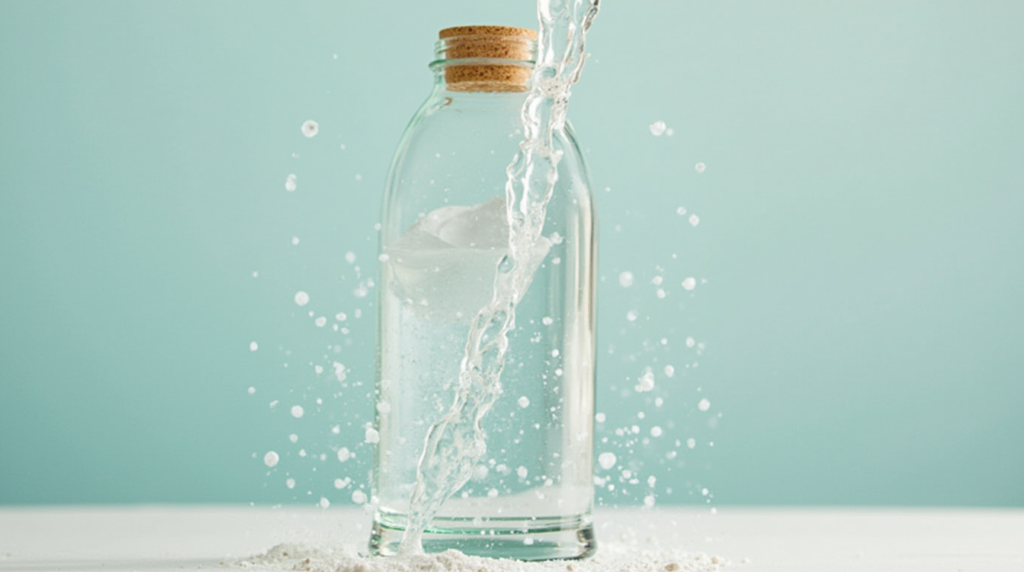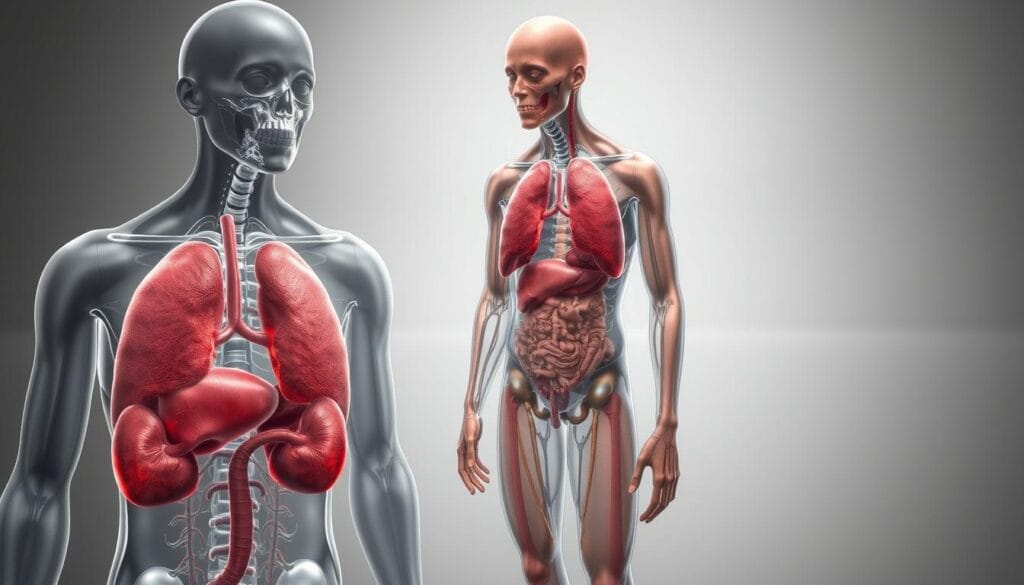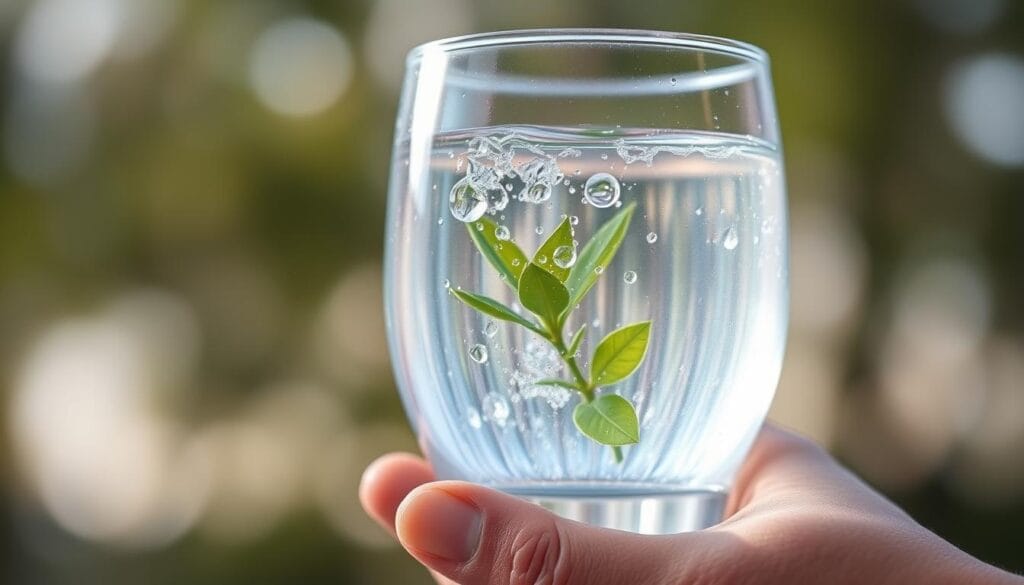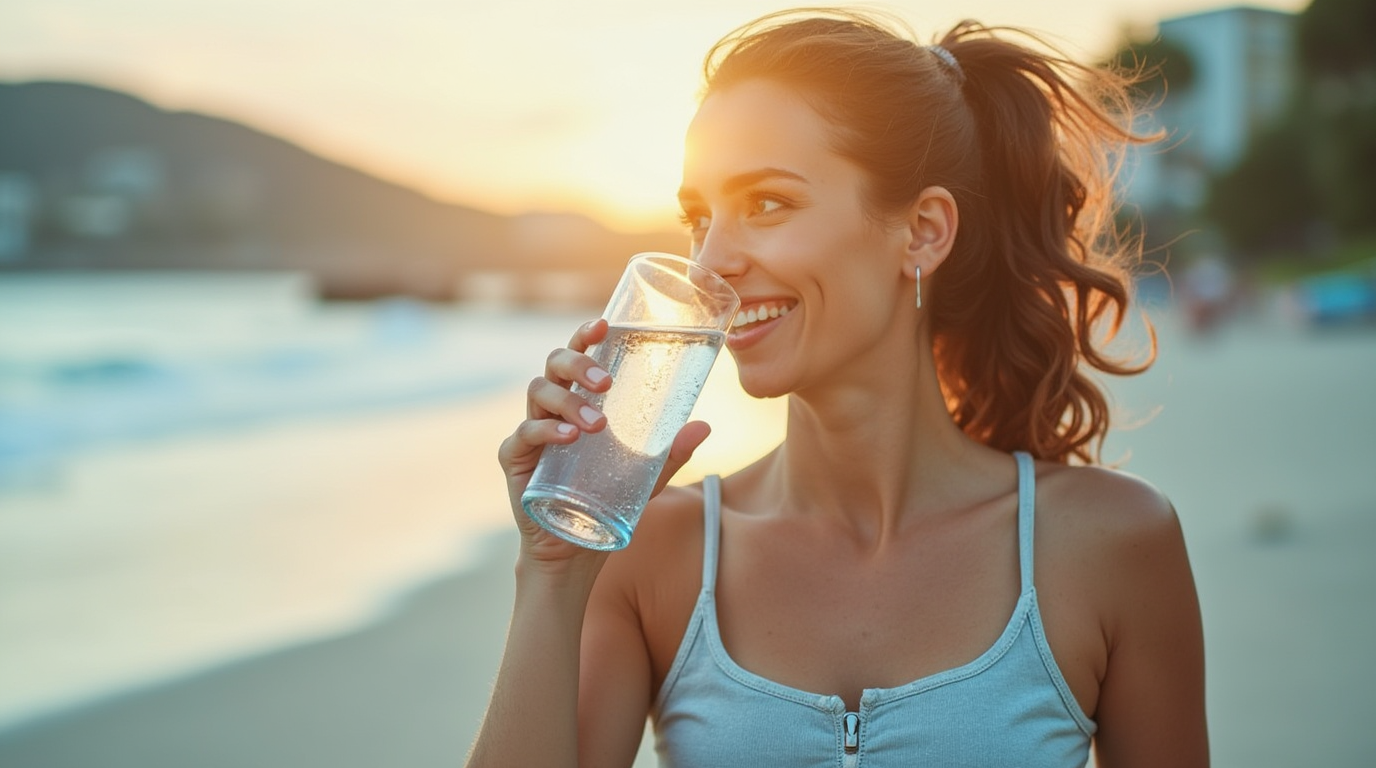Importance of hydration for health :Top 5 Reasons Hydration is Essential for Your Health
Importance of hydration for health
Ever felt foggy after a long day or hit a midday slump? Your body might be asking for water. Every cell, tissue, and organ needs hydration to function well. Yet, nearly half of Americans don’t drink enough, affecting digestion and mood.
Think about this: drinking water can sharpen your mind, ease fatigue, and boost your mood. It’s not just about quenching thirst—it’s about fueling your body’s daily needs. Let’s explore the top five reasons hydration is key to feeling your best.
Table of Contents
Understanding Hydration and Its Impact
Hydration is more than just drinking water. It’s about keeping your body in balance. Every part of you needs water to work right. Without enough, even a little dehydration can make you feel slow.

What is Hydration?
Your body is made up of 60% water. Hydration keeps this balance so everything works well. It helps with digestion, carries nutrients, and keeps your body cool. When you’re hydrated, your blood flows well, bringing oxygen to your muscles and organs.
| Function | Benefit |
|---|---|
| Regulates body temp | Prevents overheating |
| Aids digestion | Breaks down food for energy |
| Supports circulation | Delivers nutrients to cells |
Why It Matters for Your Well-Being
Staying hydrated helps you do better every day. Your brain needs water to stay sharp. Dehydration can cause headaches and tiredness fast. Drinking water also makes your skin clearer and your joints healthier. Every little bit helps!
- Sharpens mental clarity
- Keeps energy levels steady
- Supports immune function
Every sip counts. Your body tells you when it needs water. Listen to those signs!
Benefits of Staying Hydrated
Hydration is more than just quenching thirst. It’s essential for your body’s daily functions. Drinking enough water helps your body work well, from making energy to getting rid of toxins.
- Boosts Energy and Focus: Water carries nutrients and oxygen to your cells, giving you energy. Even a little dehydration can make you feel tired1.
- Supports Digestive Health: Your body makes seven quarts of digestive fluids every day. Drinking enough water helps digest food and prevents bloating2.
- Protects Kidneys and Detoxes Toxins: Water helps remove waste through urine, easing the kidneys’ job and preventing toxin buildup3.
| Benefit | Body Function | Source |
|---|---|---|
| Energy Support | Cell nutrient delivery | 1 |
| Digestive Aid | Fluid for nutrient breakdown | 2 |
| Detoxification | Waste removal via kidneys | 3 |

How Hydration Boosts Your Energy and Mood
Feeling tired or forgetful? Mild dehydration can make you feel sluggish and unfocused. Losing just 2% of your body’s water, like after exercise, can slow your thinking and lower your mood. Drinking enough water keeps your mind sharp and your energy steady. Knowing how much water to drink daily helps you stay alert and focused.

Energy Levels and Mental Clarity
Your brain needs water to work well. When you’re low on fluids, tasks seem harder. Dehydration can make you feel tired, foggy, or irritable. Drinking the right amount daily fuels your body and brain. Even small sips throughout the day keep your energy flowing smoothly.
Improved Mood and Focus
Hydration is not just for physical health—it’s also for emotional balance. When you’re hydrated, you’re more likely to feel positive and focused. Water helps stabilize mood swings and sharpens attention. Track your intake to avoid the 2% drop that studies link to mood drops. Small changes, like carrying a water bottle, make it easier to hit your daily goal.
The Importance of Hydration for Health
Hydration is more than just drinking water when you’re thirsty. It’s essential for your body’s daily functions. Without enough water, your body can’t even do simple tasks. Knowing the signs of dehydration early can stop serious problems.
Studies show dehydration hurts your kidneys, messes with digestion, and causes headaches.
- Kidney Health: Not drinking enough water can slow down waste removal, raising the risk of kidney stones.
- Digestive Health: Dehydration can cause constipation and stomach pain.
- Headaches and Fatigue: Even a little dehydration can lead to headaches and make you feel tired.
| Health Area | Impact of Dehydration | Reference |
|---|---|---|
| Kidneys | Reduced filtration efficiency | |
| Digestive System | Slowed movement, constipation | |
| Brain Function | Headaches, difficulty focusing |
Your body’s cells, organs, and systems need water to work right. Ignoring early signs of dehydration can lead to long-term damage. Pay attention to your body’s signals and drink enough water every day.
Exploring the Impact of Dehydration on Your Body
Not drinking enough water can mess up your day and hurt your health over time. Even a little dehydration can make you feel tired and mentally foggy. Here’s what happens:
Physical Effects of Dehydration
- Fatigue: Not enough water slows down your energy, making you feel really tired4.
- Headaches: Less brain fluid can lead to headaches that make it hard to focus4.
- Dizziness: Dehydration can make your blood pressure drop, causing you to feel dizzy when you stand up4.
- Dark Urine: If your urine is dark, it means your body needs more water right away4.
Long-Term Consequences
Ignoring dehydration can lead to serious problems:
- Kidney Stones: Not drinking enough water can increase your risk of kidney stones and harm your kidneys5.
- Cognitive Decline: Long-term dehydration can weaken your memory and mood5.
- Heat Illnesses: Severe dehydration can make you more likely to get heatstroke when you’re active5.
Your body tells you when it’s thirsty. Pay attention to these signs to avoid problems and keep your body healthy. Drinking small amounts of water all day can stop you from feeling bad and prevent serious health issues.
How Much Water Should You Drink Daily?
The best drinks for hydration start with water, but how much do you really need? The common advice is eight 8-ounce glasses daily, totaling about 2 liters. This is a simple guideline, but your needs might vary.
Factors like activity level, climate, and body weight matter most. For example:
- Active lifestyles need more water. Sweating during workouts means drinking extra fluids.
- Hot weather increases sweat, so drink more to replace lost fluids.
- Heavier individuals may require larger quantities than lighter ones.
| Activity Level | Recommended Daily Intake |
|---|---|
| Sedentary | 2-3 liters |
| Moderate Exercise | 3-4 liters |
| Strenuous Workouts | 4-5 liters |
| Hot Climate | Additional 1-2 cups |
Track your thirst and urine color. Pale yellow means you’re hydrated; dark yellow signals you need to drink more. While water is best, drinks like herbal tea or diluted fruit juice count toward your total. Avoid sugary sodas—they don’t hydrate as well. Listen to your body and adjust as needed.
Recognizing the Signs of Dehydration
Knowing the signs of dehydration is key. Look out for dry mouth, dark-colored urine, or feeling dizzy. These are your body’s signals that it needs water.
If you ignore these signs, you might face bigger problems. These could include a fast heartbeat or confusion. It’s important to listen to your body’s signals.
Warning Symptoms to Watch For
- Headaches or lightheadedness
- Reduced urine output or dark urine
- Extreme thirst or dry lips
- Fatigue or sluggishness
Electrolytes like sodium and potassium are crucial. They help your body keep fluids. Without them, dehydration symptoms can get worse. It’s important to watch for these signs to avoid serious problems.
When to Seek Help
See a doctor if you have:
- Inability to keep fluids down for over 24 hours
- Severe abdominal pain or disorientation
- Symptoms lasting more than a day without getting better
Severe dehydration might need medical help. Don’t ignore these signs. They could seriously affect your health.

Staying Hydrated for Better Health: Tips and Tricks
Starting to drink more water is easy. Just take small steps every day. These tips will help you drink more water naturally. This will improve your hydration and overall well-being easily.
Daily Reminders to Drink Up
Simple reminders can help you remember to drink water.
- Set hourly phone alerts with friendly messages like “Hydration Break!”6,
- Stick notes near your desk or fridge act as visual prompts to drink water6,
- Pair water intake with routines—sip before meals or while commuting6,
- Always have a reusable bottle nearby, whether at work or in the car6.
Creative Hydration Solutions
Make drinking water fun. Try adding lemon, berries, or mint to your water for flavor. This way, you avoid sugar7. Also, eat foods with lots of water, like watermelon or cucumbers7.
Use apps like WaterMinder to track your water. It helps you set goals and see your progress. Plant Nanny makes drinking water a game. Your virtual plant grows as you drink8.
By using these ideas, drinking water becomes a fun part of your day. It fits well into your lifestyle.
Best Drinks for Hydration and the Role of Electrolytes
Choosing the right drinks keeps your body fueled and balanced. Let’s explore which options work best for your daily needs.
Water vs. Sports Drinks
Plain water is your go-to for most days. It’s easy on your wallet and perfect for light activity. But when you sweat a lot—like during marathons or hot weather—your body loses electrolytes. That’s where sports drinks shine.
- ✅ Water: Everyday hydration – Cheap, no added sugar
- ✅ Sports Drinks: For intense workouts – Replenish electrolytes
- ✅ Electrolyte Beverages: For hot climates or long exercise – Balances sodium and potassium
Understanding Electrolytes
Electrolytes like sodium and potassium keep muscles and nerves working. When you sweat heavily, these minerals get flushed out. Replacing them helps prevent cramps and fatigue.
- Water alone may not be enough during long workouts.
- Sports drinks add carbs and electrolytes for energy.
- Electrolyte tablets or drinks restore balance quickly.
Stick to water most days. Save sports drinks for when you’re active for over an hour. Your body—and performance—will thank you!
Practical Strategies to Make Hydration a Habit
Turning hydration into a daily routine doesn’t have to feel like a chore. Small changes can make drinking water easy. Here’s how to start:
- Track with Tech Tools Pair a smart water bottle like HidrateSpark with an app that tracks your intake. These devices sync with your phone to remind you to sip regularly.
- Set Timed Reminders Use apps like WaterMinder to schedule alerts every 1–2 hours. Pair each reminder with a task, like refilling your cup when you check emails.
- Pair Water with Meals Drink a glass before every meal or snack. Add cucumber or lemon for flavor—no calorie additives needed!
| Strategy | How It Works | Example |
|---|---|---|
| Smart Bottles | Tracks ounces consumed via Bluetooth | HidrateSpark LED indicator |
| Meal Timing | Leverages routine eating habits | Drink 8 oz before lunch and dinner |
| Flavor Boosts | Adds taste without sugar | Cucumber slices in water |
Consistency matters most. Start with one strategy and build from there. Your body—and your energy levels—will thank you.
Conclusion
Hydration is key for your body’s daily needs. It helps flush out toxins and supports kidney health. It also lowers the risk of kidney stones and UTIs9.
Water keeps your skin looking great and boosts your energy. It helps nutrients flow better and can even reduce joint pain910.
Drinking water before meals can help you eat fewer calories. This can help you manage your weight over time910. Even a little dehydration can make you feel slow and affect your mood. So, drinking water regularly keeps your mind sharp10.
Start small by carrying a water bottle and eating hydrating foods like watermelon or spinach. Tracking your water intake can also help. These small steps can become healthy habits that improve your life every day10.
Every glass of water you drink is important for your long-term health. So, make hydration a top priority today.
Source Links
- https://www.healthline.com/nutrition/7-health-benefits-of-water
- https://health.umms.org/2019/07/15/stay-hydrated/
- https://thefrisky.com/benefits-of-drinking-water-and-staying-hydrated/
- https://www.healthline.com/health/how-to-tell-if-youre-dehydrated
- https://my.clevelandclinic.org/health/diseases/9013-dehydration
- https://drinkeverly.com/blogs/everly/12-ways-to-remember-to-drink-water
- https://www.nashvilleweightloss.com/single-post/sip-smart-creative-ways-to-stay-hydrated
- https://www.liquid-iv.com/articles/these-water-reminder-apps-keep-your-hydration-flowing
- https://www.gardenoflife.com/blog/top-7-reasons-stay-hydrated
- https://www.ncoa.org/article/10-reasons-why-hydration-is-important/

